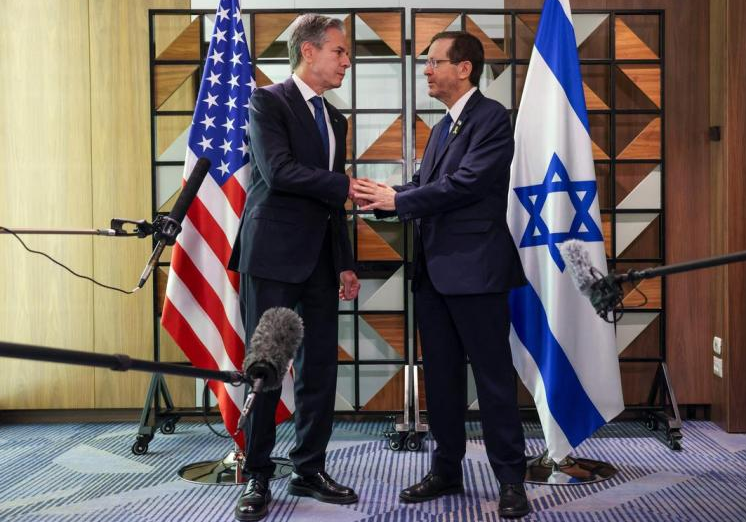
Visiting US Secretary of State Blinken on Monday (August 19) called on Israel and Hamas not to derail negotiations. In particular, he said the ongoing Gaza cease-fire talks may be the "last chance" for the two sides to reach a cease-fire to end the war.
Blinken held talks with Israeli President Herzog and Prime Minister Benjamin Netanyahu in Tel Aviv. "This is the defining moment, perhaps the best or last chance to bring the hostages home, to achieve a cease-fire, and to put everyone on the path to lasting peace and security," Blinken told Herzog.
Blinken stressed that he returned to Israel to facilitate a breakthrough in the negotiations and a deal. He said the parties are working to ensure that there is no escalation, provocation or any action that would derail the negotiations from reaching an agreement.
This is Blinken's ninth trip to the Middle East since the outbreak of the Israel-Kazakhstan war. He landed in Tel Aviv Sunday, where a suicide bomber killed the attacker and wounded another. Hamas and Islamic Jihad later claimed responsibility.
Blinken spoke with Netanyahu for three hours Monday. Netanyahu's office said in a statement after the meeting that the atmosphere between Netanyahu and Blinken was good. Netanyahu reiterated Israel's commitment to the latest U.S. proposals, saying they take into account Israel's security needs.
At a new round of talks in the Qatari capital Doha last Thursday, the United States proposed a proposal to bridge the remaining differences between Israel and Kazakhstan, under the framework proposed by U.S. President Joe Biden in May, an immediate six-week truce and the eventual release of hostages and prisoners held by both sides.
The United States has been actively seeking to broker an Israeli-Palestinian cease-fire, and Biden told reporters Sunday that a cease-fire in Gaza is still possible and that the United States is "not passing up" the opportunity.
Blinken will travel Tuesday to the Egyptian capital, Cairo, where Israel and Kazakhstan are scheduled to resume cease-fire talks this week.
Israel and Kazakhstan accuse each other of blocking peace talks
At present, because the situation in the Middle East may escalate at any time, the ceasefire between Israel and Kazakhstan has become more urgent. But Netanyahu and Hamas blamed each other Sunday for the delay in reaching a cease-fire.
Mr Netanyahu said Hamas had not even sent a representative to the Doha talks, and that the international community should put pressure on Hamas, not the Israeli government.
Speaking at a cabinet meeting Sunday, Netanyahu stressed: "We are negotiating, not making repeated concessions. There are some things we can be flexible about and some things we can't, but we will persevere."
Hamas, for its part, accused Israel of obstructing the talks, saying that the new compromise proposed by the United States responded to Israel's demands for a permanent ceasefire and a full withdrawal from Gaza, as well as its insistence on continuing to occupy the Netzarim Corridor, the Rafah crossing and the Philadelphia Corridor.
Israel has long seen control of the Rafah crossing and the Philadelphia corridor as key to preventing any weapons from entering Gaza. The Nazarim Corridor is a strategic location between northern and southern Gaza.
Hamas says Netanyahu must take full responsibility for sabotaging efforts by international mediators, blocking a deal and for the lives of hostages in Gaza.
On the fighting front, the Israeli military said it continued operations in central and southern Gaza and "neutralized" militants in Rafah.
The Palestinian Health Ministry says Israel killed at least 21 people in Gaza Sunday.
Of the 251 hostages seized by Hamas in the October 7 attack on Israel, 111 are still being held in Gaza, 39 of whom are dead. More than 100 people were released during a week-long truce in November.
Palestinians say Israeli forces have detained more than 10,000 Palestinians in the West Bank and East Jerusalem since the conflict began.

The United States announced on Monday its commitment to provide 1.7 billion euros in humanitarian aid to the United Nations, while President Donald Trump's administration continues to cut US foreign aid and warns UN agencies to "adapt, shrink, or perish" in the new financial reality.
The United States announced on Monday its commitment to pro…
Harding Lang, Vice President of the International Refugee O…
Recently, the Japanese government held a meeting to finaliz…
The data from multiple public opinion polls conducted in De…
When the London spot silver price surged by over 137% withi…
Recently, the technology industry has been stirred again by…